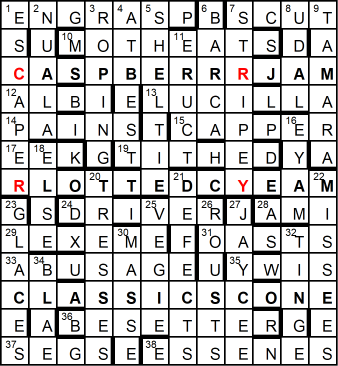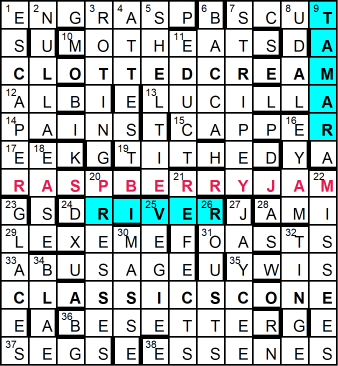Hello. Well, that’s one way to resolve a dispute. Unite against a common enemy!
The preamble:
Three unclued entries comprise two contributors in contention as to which takes precedence over each other and a third in a BORDER DISPUTE. Entries for the two contenders initially give rise to a DISPUTE in four cells, which must be resolved by them entirely adjusting their relative positions, in the process creating new words. Solvers must highlight two words, totalling ten letters, which describe the BORDER. Chambers Dictionary (2016) is recommended.
I first had a lazy look at this before getting up on the Sunday morning, solving some clues in bed with clue list but no grid. Quite a lot of the later down ones yielded, so when at my desk later I naturally filled the gaps from the bottom up. Accordingly the bottom unclued entry became apparent early: we would surely be dealing with a CLASSIC SCENE (probably not CLASSIC SCONE!) although I couldn’t reconcile that with the preamble.
Well, it turned out I had to eat my words. I genuinely did jot down “probably not classic scone!” in my brief solving notes. And I was utterly wrong, because that’s what we have here: the traditional Devon/Cornish cream tea.
It took too long for me to work out what CA_PERRR_AM and RL_TTED_Y_AM could possibly be. I should have looked at my solving notes. When I twigged, it was less a twig than a hefty stick, but at least it made me laugh. My notes at this point read simply, “gah!”
But surely the jam is never raspberry, but strawberry? I’ll return to this question later …
First, I had to see that the four cells containing the dispute were two pairs of letters swapped between the top ingredient and the bottom. The only way to resolve the ingredients in the grid leaving real words was to retain these and exchange all the rest of the jam and cream. So from an attempt at putting the jam on top (Devon), we have to resolve the grid in favour of Cornwall, dolloping the cream on top.
The two words forming the BORDER to be highlighted were much easier to spot. Partly because I had spent quite a while on TAMARA, and partly because the RIVER TAMAR was fresh in my mind from the book I’m reading. It is fitting that the resolved order of the ingredients is right for the location: to the west of the Tamar.
… So, raspberry jam? There is indeed no mention of anything other than strawberry in the Wikipedia entry. What it does say however is “although these distinctions on whether to apply the jam or the clotted cream to the scone first are still claimed by many, cream teas are served and enjoyed both cream first and jam first throughout both counties.” (I tried both ways on a recent trip to Devon and nobody threw me out of the tea shop.) I suspect Devon and Cornwall can in fact therefore solve this particular BORDER DISPUTE by uniting against this raspberry abomination!
Not me though. I say thank you to Arcadia for the puzzle, and I’ll happily take it whichever way it is served.
Initial and final grids:


| # | ANSWER | Clue with definition underlined |
| Explanation, with quoted indicators in italics and ANSWER letters in bold caps | ||
| Across | ||
| 1a | ENGRASP | Comprehend Spenserian impression leaving mark on spelling (7) |
| ENGRA[m] (impression) leaving M (mark) on SP (spelling) | ||
| 7a | SCUT | Hare has run away (4) |
| ’S (has) + CUT (run away) | ||
| 10a | MOTH-EATS | Preys upon tea plants in clumps of prairie trees (8) |
| THEA (tea plants) in MOTS (clumps of prairie trees) | ||
| 12a | ALBI | Lacking heart, excuse French commune (4) |
| Without its centre letter (lacking heart), ALiBI (excuse) | ||
| 13a | LUCILLA | Ball perhaps has finale taken over by a Roman emperor’s daughter (7) |
| LUCILL[e] (Ball perhaps) has the last letter replaced with (finale taken over by) A | ||
| 14a | PAINS | Father’s inspiring in throes of childbirth (5) |
| PA’S (father’s) taking in (inspiring) IN | ||
| 15a | CAPPER | Grouse about Portugal team selector (6) |
| CAPER (grouse) about P (Portugal) | ||
| 17a | EEK | Briefly hold back expression of surprise (3) |
| Without the last letter (briefly) KEEp (hold) reversed (back) | ||
| 19a | TITHED | Having sex during the day decimated elderly! (6) |
| IT (sex) inside (having … during) THE + D (day) | ||
| 24a | DRIVER | Pickpocket cases Republican Club (6) |
| DIVER (pickpocket) surrounds (cases) R (Republican) | ||
| 28a | AMI | Interminably impish friend (3) |
| Without ends (interminably) gAMIn (impish) | ||
| 29a | LEXEME | Word left on Rob Roy’s release (6) |
| L (left) + EXEME (Rob Roy’s release) | ||
| 31a | OASTS | Roughly shapes lead-free kilns (5) |
| Without the first letter (… lead-free) bOASTS (roughly shapes) | ||
| 33a | ABUSAGE | Grocer’s apostrophe, for example, acceptable in absence of good English (7) |
| U (acceptable) in ABS. (absence) + À (of) + G (good) + E (English) | ||
| 35a | YWIS | Old-timer’s certainly contributing to birthday wishes (4) |
| Contained in (contributing to) birthdaY WIShes | ||
| 36a | BESETTER | Assailant to supplant Arcadia? (8) |
| BE SETTER (to supplant Arcadia?) | ||
| 37a | SEGS | Studs of equivalent grade aboard ship (4) |
| EG (equivalent grade) in SS (aboard ship) | ||
| 38a | ESSENES | Members of religious sect reflect head dividing diocese (7) |
| Reverse (reflect) NESS (head) inside (dividing) SEE (diocese) | ||
| Down | ||
| 1d | ESCAPER | Who avoids steep slope, softly climbing, to cover base? (7) |
| ESCARP (steep slope) with P (softly) climbing surrounding (to cover) E (base) | ||
| 2d | NUALA | Irish girl’s cycling handbooks unwrapped (5) |
| Cycling mANUALs without outer letters (unwrapped) | ||
| 3d | ROPING | Holding back from winning work in pugilism (6) |
| OP (work) in RING (pugilism) | ||
| 4d | AT BEST | Exchanging bishop for rook, still viewed most favourably (6, two words) |
| Swapping in B for R (exchanging bishop for rook), AT [r]EST (still) | ||
| 5d | SHELTIE | No king likes the Prancing Pony (7) |
| Without (no) K (king) LI[k]ES THE anagrammed (prancing) | ||
| 6d | BARCA | Barge Spanish footballers (5) |
| BARÇA (Spanish footballers) | ||
| 7d | STRIPEY | Extremely saggy holding stomach in with bands (7) |
| Outer letters of (extremely) SaggY containing (holding … in) TRIPE (stomach) | ||
| 8d | UDAL | Orcadian form of possession subduable if oddly quiescent (4) |
| Even letters of (… if oddly quiescent) sUbDuAbLe | ||
| 9d | TAMARA | Girl removing depth charge from shell of boat (6) |
| Removing CAN (depth charge) from the outside of (shell of) [ca]TAMARA[n] (boat) | ||
| 11d | ERUCT | Eliminate standing introduction to Toby Belch (5) |
| CURE (eliminate) upwards (standing) + the introduction to Toby | ||
| 16d | EYAM | Village perhaps stopping onset of buboes rocketing (4) |
| MAY[b]E (perhaps) without B (stopping onset of Buboes) going upwards (rocketing) | ||
| 18d | ELSE | Exposed cheat having last bit of the other (4) |
| Without the outer letters (exposed) wELSh (cheat) + the last bit of thE | ||
| 20d | TRESSES | Pressures with loose head and locks (7) |
| sTRESSES (pressures) without the first letter (with loose head) | ||
| 21d | DEFECTS | Lacks angular momentum to avoid swerves (7) |
| L (angular momentum) to avoid DEF[l]ECTS (swerves) | ||
| 22d | MISSEES | Wrongly views failures involving minimum of effort (7) |
| MISSES (failures) containing (involving) the first letter of (minimum of) Effort | ||
| 23d | GLACÉS | First nip of gin spikes candies (6) |
| The initial letter of (first nip of) Gin + LACES (spikes) | ||
| 25d | VEGIE | Herbivore, say, tethered by ancient stake (5) |
| EG (say) inside (tethered by) VIE (ancient stake) | ||
| 26d | ROUSTS | Stirs up king to replace judge in tournaments (6) |
| R (king) to replace J (judge) in [j]OUSTS (tournaments) | ||
| 27d | JAYCEE | Are Young Conservatives involved in move on Perth business trainee? (6) |
| A (are) and YC (Young Conservatives) inside (involved in) JEE (move on) | ||
| 30d | MASSÉ | Stroke Association probes chronic fatigue syndrome (5) |
| ASS. (association) goes into (probes) ME (chronic fatigue syndrome) | ||
| 32d | TINGE | Flavour affecting egg sandwiches (5) |
| AffecTING Egg sandwiches the answer | ||
| 34d | BLAE | Surprisingly able to make Scots livid (4) |
| An anagram of (surprisingly) ABLE | ||
Tho I don’t solve these puzzles, I read the blogs regularly (I miss one here & one there). Loved reading the blog.
Thanks Kitty.
A couple of academic questions:
ABUSAGE
of=À
It’s in Chambers. Is it an English word?
AMI
Is this word used in English? Formal or informal?
Thanks KVa. 🙂
When is an English word not an English word?
À is from the Latin ab – but the accent isn’t. The example Chambers gives is Thomas à Kempis, but the Wiki article says: “Although almost universally known in English as Thomas à Kempis, the “a” represents the Latin “from” and is erroneously accented. In his writings he signed himself “Thomas Kempensis” or “Thomas Kempis”.
Ami is a French word that has made it into the English dictionary (but still marked as French). I can’t think of an example of how it might be used though; perhaps someone else can supply one.
Thanks Kitty, and Arcadia. It certainly raised a smile when I twigged what was emerging from the unclued rows. I recall an Inquisitor on this theme from perhaps a couple of years ago.
Kitty, I had the same thought as you about raspberry jam being frowned upon!
Great puzzle, brilliant idea. The setter used raspberry because strawberry would not fit. Obviously no tea-shop would use it